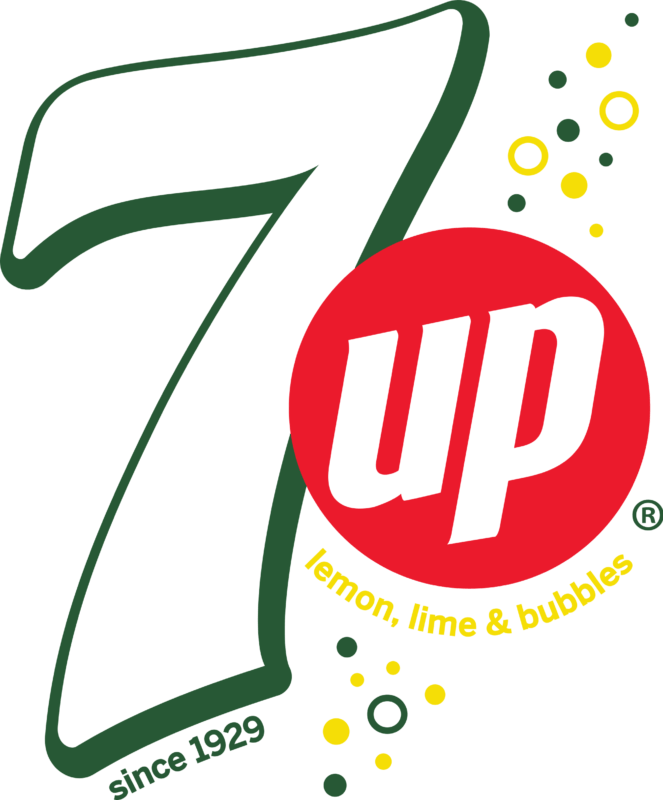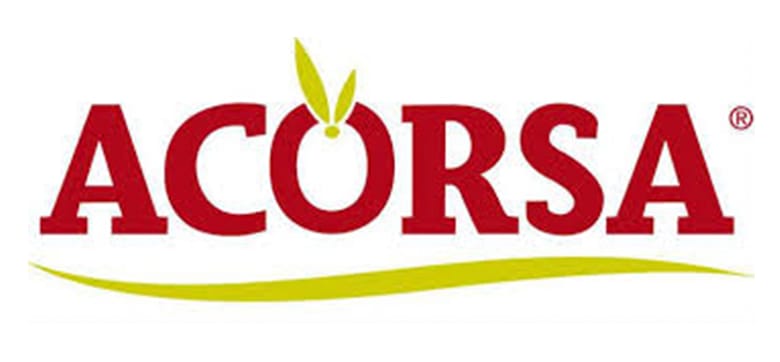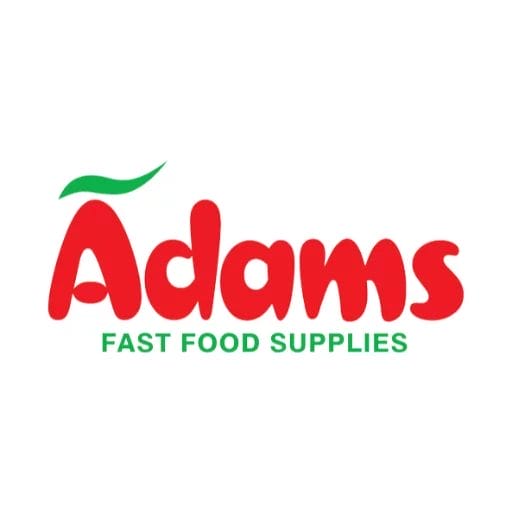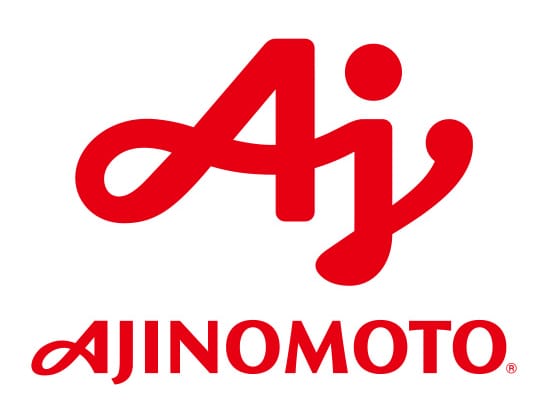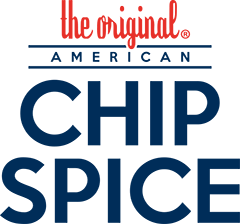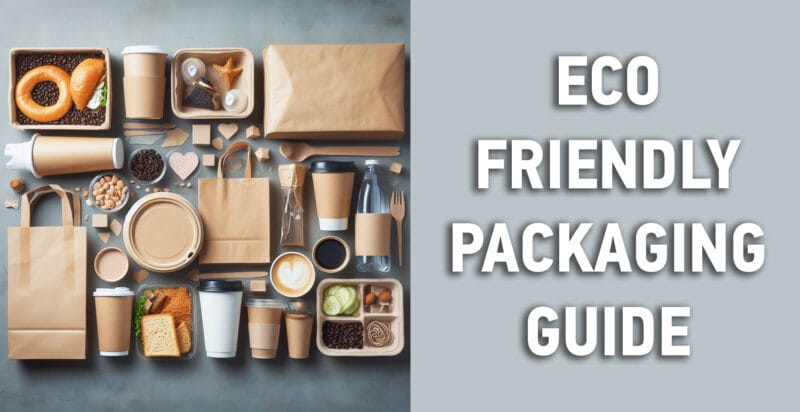
Welcome to Adams Foodservice Eco Friendly Packaging Guide for the food industry.
As of October 1, 2023, UK legislation mandates a shift towards more eco-friendly packaging for fast food businesses, signalling a pivotal moment for the industry. In addition, consumers, ever more conscientious about their ecological footprint, are steering the wheel of change, demanding more sustainable practices from their favourite eateries.
But don’t worry! We’ve got you covered with plenty of eco-friendly packaging alternatives that will not only keep your business compliant and help you make a positive impact with your customers!
This blog post will cover the following topics:
1. Adams Eco-Packaging Product guide
2. The Benefits Of Eco-Friendly Packaging
3. Types of Eco-Friendly Packaging Materials
4. Marketing your eco-friendly practises
In this eco packaging guide tailored for fast food businesses, we explore the significance of embracing greener alternatives, navigating the landscape of eco-friendly materials, and how the industry can not only comply with regulations but also cater to a growing market eager for more sustainable solutions.
1. Adams Eco-Packaging Product Guide
As a leading company in the UK food industry, Adams Foodservice has a wide range of eco-friendly packaging products that are perfect for businesses looking to ensure their packaging meets legislative and consumer environmental standards. Here is a quick guide to some of the main eco-friendlier packaging products and their ideal uses to consider for your food business.
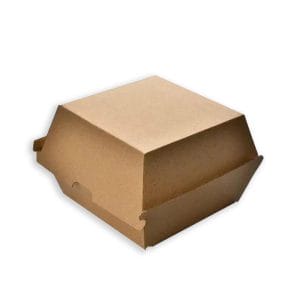
Kraft Food Boxes
Kraft food boxes are a paper derived alternative to plastic based burger and food boxes that have been traditionally used in the industry. They reduce plastic content by more than 80% compared with traditional PET food boxes and are leak proof.
Material = Kraft Paper / Cardboard
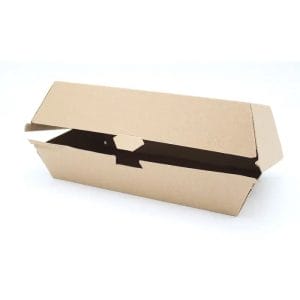
Strong Corrugated Boxes
Corrugated boxes are 100% recyclable as they are made from cardboard. Excellent for heavy products as they are made from thick, durable materials. Great if you are looking for a sturdy, environmental friendly look with your customers.
Material = Cardboard
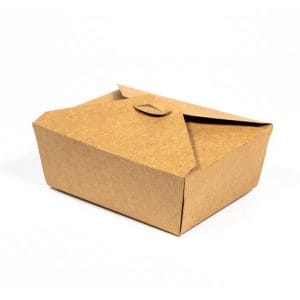
Deli Boxes
Perfect for fast food and takeaway sector, these kraft deli boxes have interlocking lids. The main material used in deli boxes is paper based meaning they use more renewable material sources than plastic boxes whilst being leak proof.
Material = Paper / Cardboard
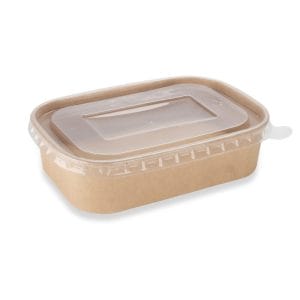
Kraft Containers & Pots
Kraft containers are an ideal replacement for plastic containers typically used for hot dishes, rice etc. The body of the container is paper derived and leak proof, the lids can be recycled.
Material = Cardboard (with plastic lid)
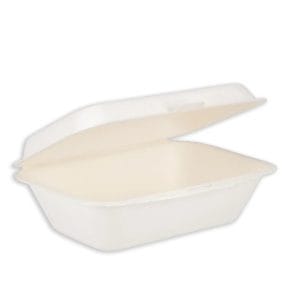
Recycled Food Boxes
Recycled boxes are made from rPET which is a recycled and recyclable material that replaces classic PET boxes that were widely used for burger boxes, meal boxes and more… They are 100% recyclable.
Material = rPET
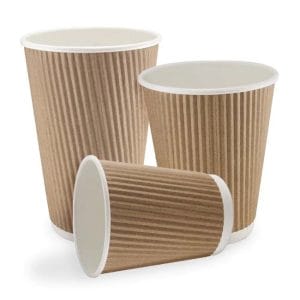
Kraft Paper Cups
Kraft paper cups are made from renewable and sustainable resources, making them better for the environment that previous plastic based cups. The lids are made of recycled plastic and can be recycled.
Material = Kraft Paper (with plastic lid)
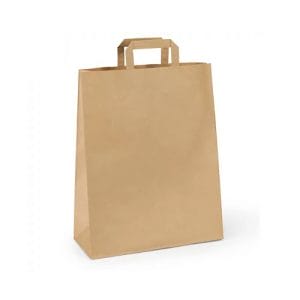
Paper Bags
Plastic single use bags have been out of vogue for sometime already but paper bags have some serious advantages over plastic. They are easier to recycle and because they are biodegradable they can be composted.
Material = Paper
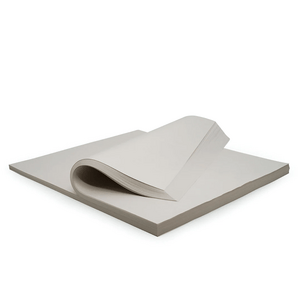
Wrapping Papers
Unlike plastic wraps, paper packaging does not damage the environment, can be 100% recyclable and it’s easy for customers to recycle or compost at home.
Material = Paper
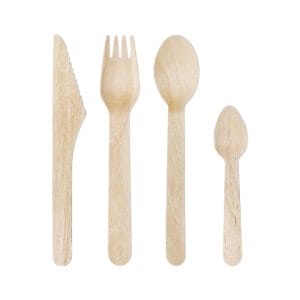
Wooden Cutlery
The perfect replacement for single use plastic cutlery, wooden cutlery is made from a natural, renewable material and be disposed of by composting without leaving traces like microplastics.
Material = Wood
2. The Benefits Of Eco-Friendly Packaging
Embracing more eco-friendly packaging in fast food businesses yields a myriad of benefits for your customers, the environment and ultimately your business.
The 3 main benefits to utilising eco-friendly packaging in your business are:
- A. Reduced environmental impact
Firstly, the use of sustainable materials leads to a significantly reduced environmental impact when compared with traditional plastic based packaging. From biodegradable containers to recyclable packaging, these choices contribute to a healthier planet by minimizing plastic, waste and carbon footprint. The fast food and restaurant industry has historically used a lot of single use, plastic based packaging but the last few years have seen a rapid move to more environmentally friendly, circular materials and products.
- B. Positive brand image and customer loyalty
- Moreover, adopting more eco-conscious packaging fosters a positive brand image and cultivates customer loyalty. In an era where consumers prioritise businesses committed to sustainable practices, updating your packaging to more eco-friendly products, positions a brand as socially responsible and environmentally conscious. Being an environmentally responsible business, is fast becoming a default expectation from your customers so it makes good business sense to align and embrace these changes.
C. Compliance with UK legislation
Importantly, incorporating such packaging is a proactive step towards compliance with UK legislation, ensuring that fast food establishments adhere to the legal framework that mandates eco-friendly alternatives. On 1st October 2023 UK legislation banned single use plastic containers, building on prior legislation which has banned single use carrier bags, straws and other products used by the food industry. By embracing the advantages of eco-friendly packaging, fast food businesses not only contribute to a greener future but also fortify their position in an increasingly environmentally aware market.
3. Types Of Eco-Friendly Packaging Materials
The move towards more eco-friendly packaging has seen rapid development of materials to offer businesses viable alternatives to tried and trusted, but more environmentally damaging plastic based packaging that have previously been the mainstay in the food industry. There are a range of innovations across materials that now allow for more sustainable packaging options:
A. Paper and cardboard
In the quest for sustainable food packaging, paper and cardboard emerge as eco-friendly heroes, helping to replace single-use plastics. These materials not only reduce environmental impact through recycling but also contribute to a circular economy as the main material, trees are renewable. From compostable containers to biodegradable wraps, they offer a guilt-free alternative, minimising the ecological footprint associated with traditional packaging. Making the switch to paper and cardboard derived packaging is a small step for businesses but a giant leap towards a greener, plastic-free future.
B. Recycled plastics
Enter the era of eco-conscious food packaging with recycled and recyclable plastics taking center stage. The closest replacement for single-use plastics, materials like rPET allow traditional food packaging to be swapped out with a circular alternative. rPET, or recycled PET (polyethylene terephthalate) plastic, serves as a sustainable material for producing packaging items like plastic bottles and food containers. Following consumer use, the original PET containers are collected through recycling programs and sent to facilities for sorting, cleaning, and conversion into rPET flakes or pellets. These rPET flakes/pellets find new life in the creation of various products, including fibers for clothing and carpets or plastic for food and beverage containers. The transformation of postconsumer PET into a valuable resource contributes to environmental conservation, as rPET boasts a lower carbon footprint compared to virgin PET.From utensils to containers, recyclable plastics offer the convenience of traditional packaging with much reduced ecological footprint. Embracing them in food packaging not only aligns businesses with sustainability goals but also marks a significant stride towards a planet-friendly approach in the fast food industry. Say goodbye to plastic pollution and hello to a greener, biodegradable tomorrow.
C. Compostable materials
Step into a sustainable future with compostable materials revolutionizing food packaging. These eco-friendly alternatives, from compostable plates to bags, seamlessly integrate into nature’s cycle, breaking down into nutrient-rich compost. Choosing compostable materials for food packaging not only minimizes waste but also nourishes the soil. It’s a win-win for both businesses and the environment, providing a guilt-free solution that aligns with the growing demand for sustainable practices in the fast food industry. Embrace compostable materials and pave the way for a greener, more harmonious tomorrow.
4. Marketing Your Eco-Friendly Practices
Effectively marketing your eco-friendly packaging practices is pivotal in conveying your commitment to sustainability to customers. There are a number of low effort, high impact tactics you can use to get the message across to your customers.
A. Social Media Campaigns
Utilise social media campaigns to showcase your green initiatives, engaging and informing your audience about the positive environmental impact.
B. In-store signage
In-store signage acts as a visible reminder, creating awareness and emphasizing your eco-conscious efforts.
C. Include messaging on your menus and printed materials
Including details on both digital and paper menus and marketing materials ensures that customers are informed about your sustainable choices, making it an integral part of their decision-making process.
D. Add an environmental page to your website
Enhance your fast food business’s transparency by adding an ‘Environmental and Eco-friendly Practices’ page to your website. Showcase your commitment to sustainability, detailing initiatives like eco-packaging, waste reduction, composting and energy-efficient practices. It’s a digital testament to your green efforts, building trust with eco-conscious consumers and setting your brand apart.
By incorporating these strategies, you not only attract environmentally-conscious consumers but also foster a positive brand image associated with responsible and ethical practices.
Conclusion
In wrapping up this eco-packaging guide for fast food businesses, the key takeaways resonate with the urgency of embracing sustainable practices in an ever-conscious market.
From reducing environmental impact and complying with legislation to fostering customer loyalty, the switch to eco-friendly packaging is now not just a trend but a necessity for the future. Whether through recycled materials, biodegradable plastics, compostables, or reusable containers, each choice contributes to a greener, more responsible fast food industry.
Remember, it’s not just about meeting regulations; it’s about aligning your brand with a sustainable ethos that resonates with the eco-conscious consumer of today and tomorrow.
Here at Adams Foodservice we are continuously improving our packaging range and environmental practices to help our customers meet legislative and customer expectations.
Shop our range of packaging products via the app today!



